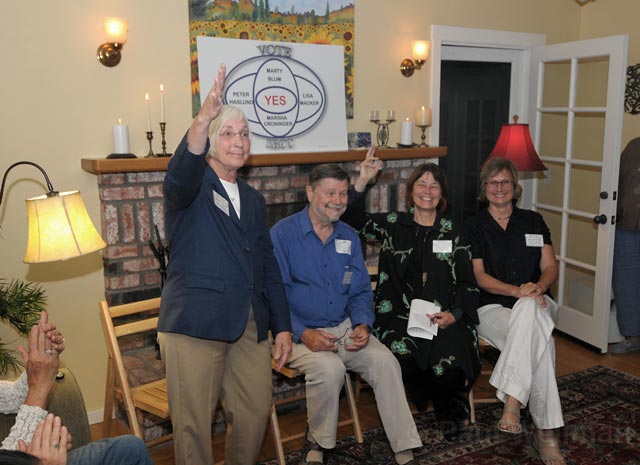
If you live in Santa Barbara, chances are that Santa Barbara City College affects your life. So you might want to wake up and pay attention to the upcoming election for four of the seven seats on the SBCC Board of Trustees. Budget troubles in Sacramento, combined with new cuts and regulations for SBCC’s Adult Education classes, are making the contest unusually hot.
At a sunset meet-and-greet on the Mesa recently, the four challengers—Lisa Macker, Marsha Croninger, Peter Haslund, and former Santa Barbara mayor Marty Blum—gathered together in a show of solidarity to formally challenge incumbents Joe Dobbs, Des O’Neill, Kathryn Alexander, and Sally Green, who, combined, have served more than 100 years on the board.
The diverse team of challengers hopes to bring its members’ varied public service backgrounds to the table in order to make necessary changes to what they are characterizing as an outdated board.
Lisa Macker, a certified public accountant who has done most of her work in the nonprofit sector, said she can bring fiscal knowledge and responsibility to SBCC that she asserts has been lacking in recent history. As a Dos Pueblos High School, SBCC, and UCSB alum, Macker voiced her concerns that the current board was not active enough in its attempt to listen to the community, nor in its evaluation of SBCC’s budgets and reserves.
Marsha Croninger emphasized fiscal responsibility, open and inclusive governance, leadership, and transparency as the main planks in her platform. She added that her background as an environmental lawyer working in Sacramento for more than 11 years for the State of California gives her an advantage in seeing options that the current board could not see.
Peter Haslund, a professor emeritus of political science at SBCC, who is the former director of the college’s Global and International Studies Program and currently teaches global studies at UCSB, pointed to his extensive experience at SBCC. Insider knowledge of life on the campus will be an asset, he said, to this foursome’s plans to change the board’s decision-making process. Haslund repeatedly reminded the 40 or so people who attended the gathering that SBCC is the “college of the people” and thus should be representative of the people. In criticizing the long-tenured boardmembers, he said emphatically that there is “too much continuity, not enough change, and not enough democracy.”
The last member of the group, Marty Blum, the recently retired mayor of Santa Barbara, in a Favre-esque return to the limelight, addressed the small crowd regarding her major contentions about the way business is currently being handled at the board. Expressing her disdain for the way the board’s once-a-month board meetings are conducted, Blum reinforced the challengers’ emphasis on transparency and the need to make the board and its meetings more accessible and accountable—whether through televised board meetings or open office hours. She said a lot more could be done to communicate to the Santa Barbara community.
Among the SBCC professors attending the function was Adam Green, professor of environmental studies and director of SBCC’s Center for Sustainability. Stressing the need for community voices to be heard, Green said that he feels this is “the right group for the job.”
This race will undoubtedly have a great deal to do with the direction SBCC and its counterpart Adult Education programs will head over the next few years, especially considering the need to deal with state budget cuts.



